#western narratives
Explore tagged Tumblr posts
Text



#israel influence#us politics#pro-palestine sentiment#pro-israel lobby#aipac#joe biden donations#illegal settlements#palestinian treatment#congressional black caucus#political lobbying#us-israel relations#social media activism#guy christensen#western narratives#political smear campaigns#election influence#tel aviv policies#high school activism
2 notes
·
View notes
Text
Podcast w/Rania Khalek and Nima Shirazi, link + transcript above ↑
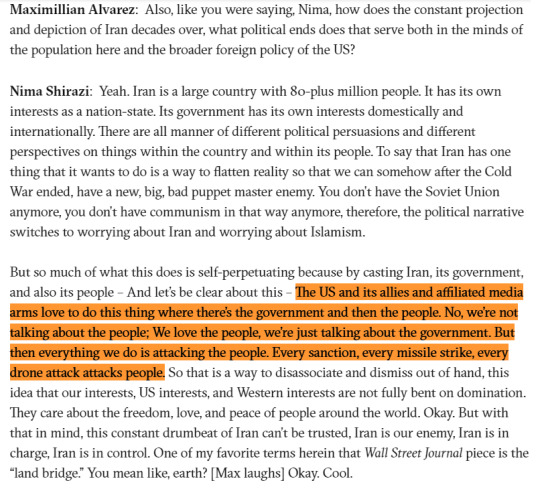
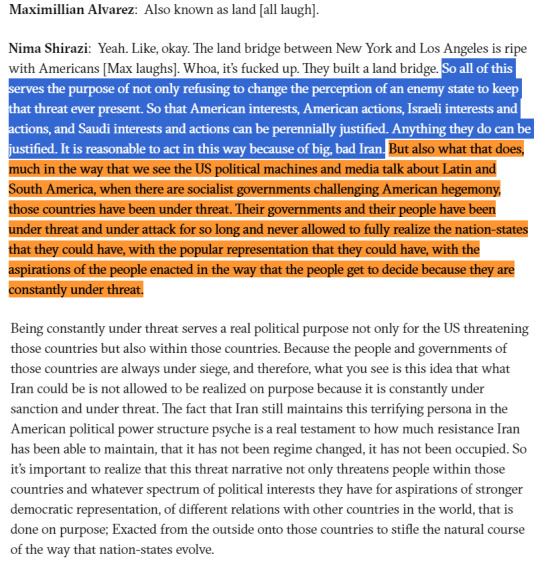
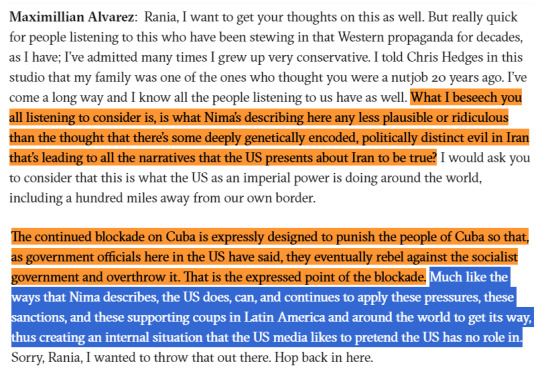
#worth reading/listen to rn seeing how western politicians and the media keeps relying on the 'Big Scary Iran' narrative#to justify the ongoing genocide in gaza#(with iran presented as this 'puppet master' dictating the actions of non-US aligned groups in the region)#before the words 'iran-backed' leaves your mouth you should at least be able to identify who the axis of resistance is and why they exist#also... what happened in iran in 1953? who was mosaddegh? what were his political goals and achievements? and so on#anyway...#palestine#axis of resistance#iran#ansarallah#hezbollah
836 notes
·
View notes
Text

Erich Maria Remarque you have ruined me
#i’m on a work trip rn for one of my jobs so i can’t post a ton of art but i AM reading this book for the 20th time#i need to find every person who’s ever read this book and sit them down. and look at them. that’s all#page 94-97. oh man. oh boy!#giggle. i’m so normal#all quiet on the western front#erich maria remarque#paul baumer#stanislaus katczinsky#those yellow boots are haunting the narrative#you ever look at your comrade roasting a goose and think yes i am experiencing the horrors but his shadow is home#and he holds the world on his shoulders#he is my comrade and he is mt brother and he is and he is and he is#wwi#wwi history#wwi literature
229 notes
·
View notes
Text
honestly the most "yikes!" thing to me about ~timkon clone baby~ aus isn't even how insanely out of character they all are. it's the way every single post i see about them really just tells on the op so hard about how much they have NOT unpacked re: the nuclear family model and consent in relationships
#rimi talks#please tell me in five hundred words or less why exactly you think that having your dna nonconsensually used to create a child--#--means you are obligated to have any sort of relationship with the person who did this without your consent.#please also tell me in five hundred words or less why you think that having a biological child with someone necessitates being--#--romantically involved with that person. please. go on. i am waiting.#for your next essay please explain in five hundred words or less why you believe any of this is the basis for a happy and healthy--#--relationship and family dynamic for the parent(s) and child(ren) involved.#and finally please reflect in seven hundred words or less on what (western conservative) ideals of the ''traditional'' family--#--you may be unintentionally endorsing and espousing with the narrative framing you have chosen.#its just. man. 😬!#timkon
73 notes
·
View notes
Note
I have no other place to yap this to so I apologise in advance.
I find it interesting in Alhaitham and Kaveh’s voicelines they tend to talk about each other A LOT in a way of complaining. Such as in Alhaitham’s Good night voiceline where he says that he’d prefer that Kaveh wouldn’t be home at all because all the chaos and noise he makes in the dead of the night. Or in Kaveh’s Good Morning voiceline where he says that he hopes that you don't run into someone who ruins your day first thing in the morning.
I guess it’s what makes other people think that they despise each other’s company. Yet they’re always viewed as a pair and Alhaitham could’ve kicked Kaveh out of the house ages ago. But what’s your opinion on that?
Hiya! there's no need to apologise, this is a safe space for all haikaveh! When I tell you your ask is scratching my brain I mean ITCHING, I have so many thoughts about this part of their dynamic so thank you for enabling me <3 This turned out to be rather long, so I hope it’s helpful to you!
The contention in both Alhaitham and Kaveh’s character stories and voice lines seems to be to create intrigue about the two as individuals, and, in turn, their relationship.


Alhaitham’s ‘good night’ voice line instantly serves as a contradiction to his character. It’s interesting, and telling, that Alhaitham, who is essentially Kaveh’s landlord, and mentions this within his fourth character story, alludes to Kaveh by using ‘roommate’ rather than ‘tenant’. ‘Landlord’ evokes a position of authority over the tenant, whereas ‘roommate’ indicates an equality between two people sharing a house – since it’s Alhaitham who advocates for the term ‘roommate’, it’s telling that, as opposed to what Kaveh believes, Alhaitham wants to establish equality between them.

In terms of what Alhaitham says in this voice line, it explicitly raises a contradiction in the form of a question: if Alhaitham is truly bothered by his roommate’s antics, why doesn’t he simply evict Kaveh?
This is relevant as this question is also posed when we initially meet Kaveh within the Archon Quest, as Kaveh states he dislikes Alhaitham’s personality, to which Alhaitham responds by saying if he bothers Kaveh so much, Kaveh always has the option to move out of the house – to which Kaveh perceives as a threat, only to then dismiss this as Alhaitham ‘changing the subject’, which seems to mean that this ‘threat’ is taken as baseless. As this isn’t called back to, this seems to be the case.


There is no real threat of eviction, and regardless of their disputes, Alhaitham ultimately gives Kaveh no ultimatum to move out. In fact, as discussed here (page 27), as we are meeting Alhaitham and Kaveh for the first time, Alhaitham allowing Kaveh to live with him contradicts his established character of living a life free of inconvenience. This instantly creates intrigue around his and Kaveh’s dynamic – who is Kaveh to Alhaitham for this exception to be made to Alhaitham’s peaceful way of life?
(An additional note of interest is that Alhaitham’s solution to the noise problem seems to be more uncomfortable than calling on Kaveh and telling him to stop his work. Alhaitham says that he’d rather not wear his noise-cancelling earpieces to bed, implying that he does so when noise is a problem at night. However, there’s no mention of Kaveh being stubborn when confronting this issue, which is why he takes to wearing his ear pieces, or any mention of confrontation at all. From this voice-line, it seems that Alhaitham avoids interaction by opting for the least comfortable option, which can be a contradiction to his character. As this is a rather brief voice-line, it’s difficult to ascertain why, but I like the idea that Kaveh is productive at night, and Alhaitham prefers not to impose on Kaveh’s work process – but this is more a headcanon than evidenced interpretation.)
Returning back to the contradiction within this voice-line, at a surface glance, this does appear to be a general complaint about Kaveh, and this can be found in Alhaitham’s lines about Kaveh, and also when discussing Tighnari. Alhaitham refers to Kaveh as ‘overly sensitive’, and ‘constantly making a fuss’.
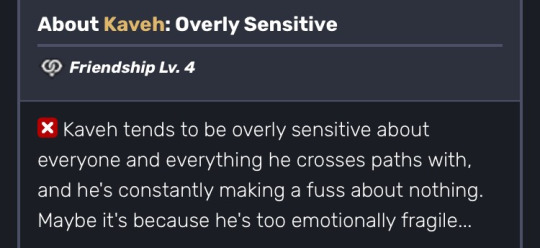
These can easily read solely as complaints, but when looking to the original CN translation, another interpretation can be found here. Alhaitham describes Kaveh as ‘caring’ or ‘tender’, which is exactly how Kaveh is described within the 3.6 special program (as per minimushiroom on twt), which can allude to how Kaveh is considerate to a fault, in that this serves as a detriment to himself.
This can be seen in Alhaitham’s other Kaveh-centred voice-line, in which he describes Kaveh buying keychains in order to provide meals for sick children, even though healthcare is free in Sumeru. Alhaitham clearly holds the view that this was a redundant action, as Kaveh, being in debt, most likely doesn’t have the money to spend on such investments that are, evidently, dubious.
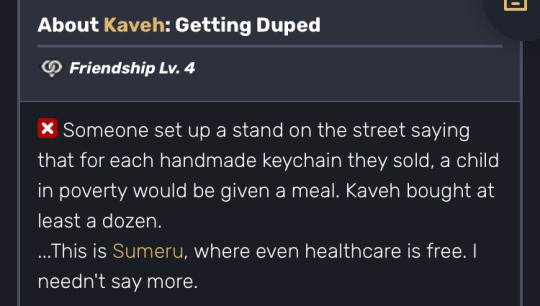
As Alhaitham provides a rational view here, this contrasts with Kaveh’s act of generosity fuelled by emotion – which highlights the contention Alhaitham has with Kaveh, in that Kaveh places himself in dangerous situations for the sake of others. However, as this can be perceived as a solely derisive line, this essential context is lacking, and can be easily misconstrued. (I think the EN translation here also coincides with this narrative, as minimushiroom notes that the original CN has Alhaitham refer to Kaveh’s sensitivity in a positive way, rather than contemptuously, as the English can be interpreted as.)
Kaveh, similarly, can be seen to complain about Alhaitham in his own voice-lines. This can be seen in the 'Good Morning' voice-line you've mentioned, where Kaveh complains about having to see Alhaitham in the morning, which 'ruins' his day. Additionally, Kaveh's voice-lines discussing Alhaitham refer to Alhaitham as ‘infuriating’ and not wanting to give Alhaitham the satisfaction of thanking him, despite Alhaitham helping him out. However, there is more nuance in these voice-lines than Kaveh simply ‘disliking’ Alhaitham, as this dislike is never stated - rather that he and Alhaitham have a difficult relationship in comparison to the ‘close’ friendship of their past.


Kaveh describes their relationship being a ‘mixed bag’, of both negatives and positives, as well as establishing a thorough understanding of Alhaitham, where other people may misinterpret Alhaitham as they ‘don’t know him well enough’. Additionally, Kaveh notes that he knows that Alhaitham can present himself in a more ‘likeable’ manner, but that Alhaitham refuses to do so, which refers to Kaveh’s contention with Alhaitham discussed within his character stories. This, in turn, generates curiosity, as it appears that Kaveh holds an in-depth knowledge of Alhaitham that the player isn’t privy to.
Referring back to Alhaitham’s ‘Good Night’ voiceline, the question raised is, if Alhaitham has a problem with Kaveh, why doesn’t he just evict Kaveh? And the answer can be found by digging further into Alhaitham’s character stories. Looking to Alhaitham’s fourth character story, it states that he is aware of the dissatisfaction Kaveh may have with their living arrangement but that ‘it matters not to him’.
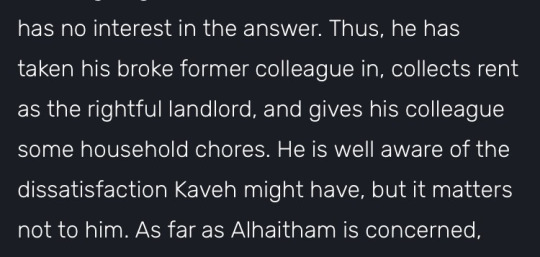
This means that he is aware that Kaveh may be unhappy with having to rely on someone else for a stable livelihood, something which his pride doesn’t naturally allow, but that this is also exacerbated due to their previous falling out and the current contentions Kaveh has with him.
At first, this can seem rather abrasive, which does fall in line with Alhaitham’s egoism as this doesn’t directly impact ‘the self’ (discussed further here), however, what immediately follows is Alhaitham’s belief that he and Kaveh are mirrors, in that his own perspective of the world will be enhanced - in the og CN, ‘completed’ -by Kaveh’s own world view.

The implication generated here with the explicit term ‘mirror’, is that, just as Alhaitham benefits from Kaveh, Kaveh, in turn, can benefit from Alhaitham. (As a side note, it is interesting then that the voice-lines in question can be seen to mirror each other – Kaveh mentions Alhaitham in ‘Good Morning’ whereas Alhaitham mentions Kaveh in ‘Good Night’.)
Returning back to Alhaitham’s character story, rather than merely reflecting each other philosophically speaking, I’d say that this also points to their respective progression as people, not just scholars.
To me, this is reminiscent of what Alhaitham says to Kaveh in A Parade of Providence – being ‘correct’, ultimately, doesn’t matter, as there is no ‘correct’ path in life, meaning that there is no ‘correct’ philosophy to shape and guide a person. Rather, Alhaitham asserts that, ultimately, their opposing philosophies are not the issue that exists between them.


The issue that does exist, then, can be surmised from Alhaitham’s actions during the event (discussed further here), in which he researches into Sachin to gauge his influence over Kaveh’s father journeying into the desert, with implicit hopes of providing closure for Kaveh, and potentially assuaging Kaveh’s guilt. This is a personal act with a personal motive; the underlying motive being concern, as opposed to an assertion of ‘correctness’.
In my opinion, I think Alhaitham’s actions during A Parade of Providence are a direct reference, and fulfilment, of Kaveh’s fifth character story. I’ve discussed here that the main reason for the ending of their friendship was them asserting the correctness of a philosophy over the other, and proposing one philosophy as the ‘solution’ to the other’s perceived flaws.
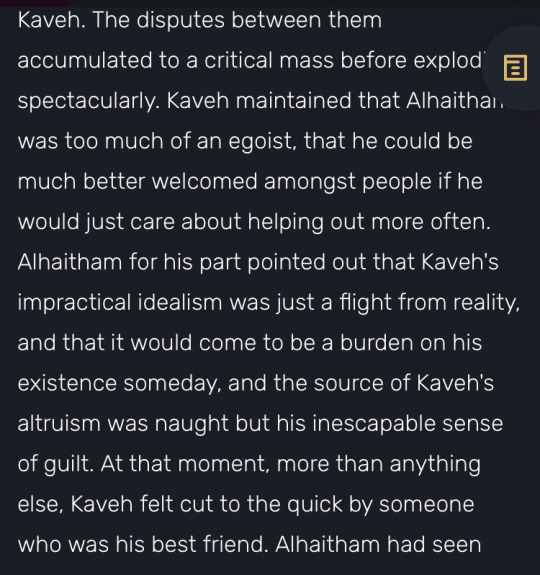

Here Alhaitham can be seen to use Kaveh’s past as the reason for his excessive altruism, implicitly referring to Kaveh’s guilt over being the supposed catalyst for his father’s demise. This final comment of Alhaitham’s appears to be the first time this has been mentioned between them, and it’s enough to be perceived as weaponisation – leading to Kaveh severing their friendship.
In A Parade of Providence, Alhaitham is shown to only have taken the role of commentator to research into Sachin, whose research we are told (by Kaveh), he has no explicit interest in, and it is heavily implied that the only reason he looked further into Sachin, was to prove to link between Sachin and Kaveh’s father. Alhaitham seems to want to absolve Kaveh of this past guilt in hopes that Kaveh will stop placing himself in the cycle of self-sabotage.
For me, when viewing this as a parallel, it highlights that Alhaitham’s motivation in speaking out during their days as students was out of concern for Kaveh, although while holding egoism as ultimately beneficial, and therefore perceivably ‘correct’. The ‘issue’ they’re currently debating is not expressly stated, and although it is unclear if Kaveh understands the implication (as discussed here), as ‘correctness’ has been overturned, there seems to be little left than the personal.
Relating this back to Alhaitham’s fourth character story, for me, Alhaitham referring to Kaveh as a mirror isn’t just referring to Kaveh as a scholar, but a person as a whole. As Alhaitham seeks to improve himself, personally, through Kaveh, it seems that he hopes to be able to benefit Kaveh in turn.
As for Kaveh’s complaints regarding Alhaitham, these can be contextualised within his own character stories. As Kaveh ultimately severed the friendship between him and Alhaitham, Alhaitham offering Kaveh to live with him, despite Kaveh revoking his previous understanding of Alhaitham (as discussed here, page 67), causes Kaveh to be overtly suspicious.
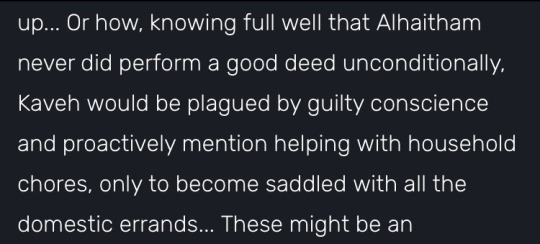
In Kaveh’s Old Sketchbook, it is mentioned that Kaveh believes there to be an ulterior motive for Alhaitham inviting him to share a house, as he believes that Alhaitham wouldn’t do something for someone else without an exchange.
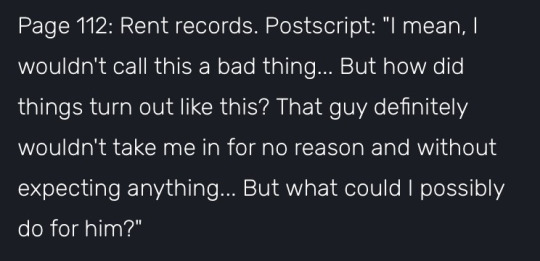
Kaveh, then, openly distrusts Alhaitham due to this unspoken motive, and although he takes on chores to ease his sense of guilt of being a perceived burden, a contention arises here. Due to their previously ended friendship, and with how Alhaitham hurt Kaveh, and how Kaveh may believe he hurt Alhaitham (discussed here), Kaveh sees no reason for Alhaitham to want him around – he treats their relationship as an exchange, asking what Alhaitham could possibly want for him.
Although Alhaitham views Kaveh as a mirror, and therefore, respects Kaveh’s perspectives, Kaveh can potentially view their opposing philosophies as a negative rather than a positive as he had done in the past (as discussed here), as it, perceivably, was what led to the end of their friendship. In this, Kaveh views Alhaitham as disparaging him and his views. As mentioned in his character story, he has no reservations in telling Alhaitham of his debt as Alhaitham has already seen through him in the past, and yet again, upon meeting at the tavern.
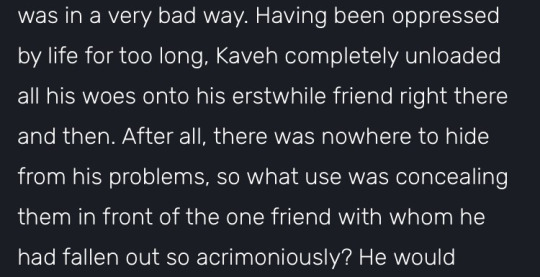
Although Alhaitham perceivably views him unfavourably, and his comments and complaints appear to propagate this interpretation, Alhaitham also seems to have no issue with keeping Kaveh around, and interacting with Kaveh, regardless of the problems Kaveh expressly has with him.
To Kaveh, it could be that as Alhaitham has already seen the worst of him, and appears to have no real issue with their stilted rapport, there is no point in donning a front and using niceties. He is open with his issues with Alhaitham, and, in turn, Alhaitham is open with him.
This appears to be a dual negative and positive for Kaveh, as he describes Alhaitham’s constancy as ‘the most unshakable part of one's past is a friend that will never change’. In this sense, his unsteady rapport with Alhaitham is reliable, and therefore, has no reason to change.

Clearly, there is a large disconnect between Alhaitham’s view of Kaveh and how Kaveh perceives Alhaitham’s view of him. As previously mentioned in the discussion of A Parade of Providence, there is an unspoken ‘issue’ between them, and this can be interpreted as dire misconceptions borne from miscommunication.
As discussed, Kaveh and Alhaitham reference each other a lot in their respective voice-lines and their character stories. This alone is enough to connect them, regardless of the cruciality of their mirror motif, as they are key figures of each other’s past, present, and seemingly, future. Despite this, it’s as you say, there’s a common perception to view them as mutually disliking each other, and, to me, this is based upon their first initial interaction, and the way they refer to each other in their own character stories and voice-lines.
It’s notable that Alhaitham refers to Kaveh in his voice-lines when Kaveh is not explicitly relevant, such as in his Good Night voice-line, and, most interestingly, when Alhaitham discusses Tighnari.

This could be because Alhaitham knows of Tighnari through Kaveh, but as this connection isn’t stated, it reads as Alhaitham mentioning Kaveh for no other reason than to complain about his perceived naivety regarding relations with others. But as this is a voice-line designated to discussing Tighnari, it’s interesting, and incredibly noticeable, that Alhaitham then discusses Kaveh instead. It’s similar to what Kaveh can be seen to do, and is observed to do by others, in relation to discussing Alhaitham.

When it comes to Kaveh, however, his complaining of Alhaitham can be seen to link with his process of dealing with troubles in his work. In his Hangout, he states that he takes his work to heart because he cares about it, which is expressed in the same quest in which Kaveh and the Traveller run into Alhaitham in the House of Daena (discussed further here, page 219).
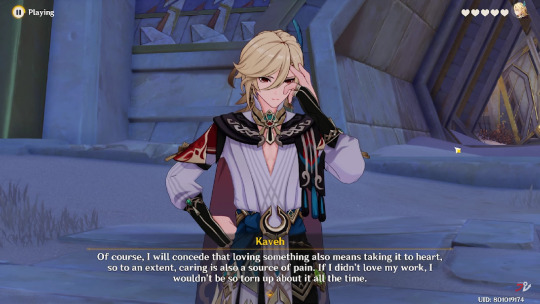
Drawing a parallel here can further contextualise Kaveh’s complaining of Alhaitham – if Kaveh truly disliked Alhaitham, there seems to be no reason for Alhaitham to remain so relevant to him, both in conversation, and in private thought. Additionally, Kaveh is described as an empathetic person, and when dealing with others, he is thusly seen to look for another perspective rather than act on his own subjective perspective.
Looking at his voice-line on Dori, for example, expresses his distaste for Dori pressuring him for Mora due to his debt, however, he also empathises with her, and states that he senses there must be a reason why Dori acts in such a way.

In contrast, this empathy can be perceived as missing in his treatment of Alhaitham, and therefore Kaveh complaining about Alhaitham can be perceived as blatant dislike – which contradicts Kaveh’s benevolence and empathy, which A Parade of Providence particularly stresses.
Kaveh’s treatment of Alhaitham can be seen as deliberately contradictory, as it can cause the player to question why Kaveh reacts in such a singular way to Alhaitham, just as why Alhaitham reacts in a singular way to Kaveh.
In reference to Alhaitham, whilst Alhaitham tends to complain about Kaveh in turn, his actions reveal him. He invites Kaveh to live with him, gives no eviction date, pays for Kaveh’s tabs willingly, (supposedly) buys wine as an apology, and goes out of his way to ensure dialogue with Kaveh – which contradicts his own character stories, in which he appears to favour solitude, and only greets those he considers his friends ‘with a nod or two’.

Moreover, Alhaitham is established as considering Kaveh a necessity to his ‘peaceful life’ he seeks to maintain (as discussed here), and can be seen to implicitly consider Kaveh one of his priorities within his Story Quest.
The idea that Alhaitham dislikes Kaveh seems to stem from Alhaitham being taken literally when voicing an opinion, or an issue, or simply joking, in reference to Kaveh – despite his character stories highlighting that Alhaitham often uses sarcasm in order to subvert expectations.

Alhaitham expressly states that he prefers to be seen as inscrutable, and unknown, by the general public, and uses subversion as a means to do so. In these character stories, Alhaitham openly encourages speculation of his own words.
Without this context, it seems easy to simplify Alhaitham to purely speaking factually when first addressing Kaveh in the Archon Quest – stating that having to explain things to Kaveh is ‘a nuisance’, and yet, it is overlooked that Alhaitham stays in the House of Daena, regardless, knowing Kaveh would find him again.
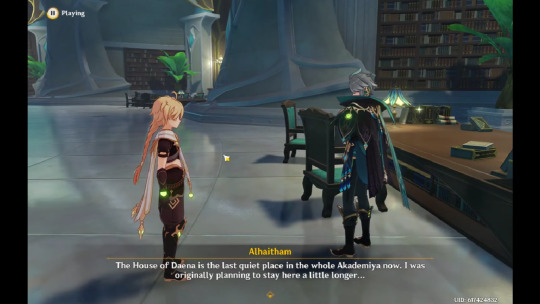
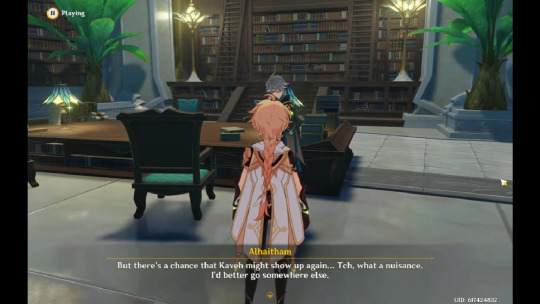
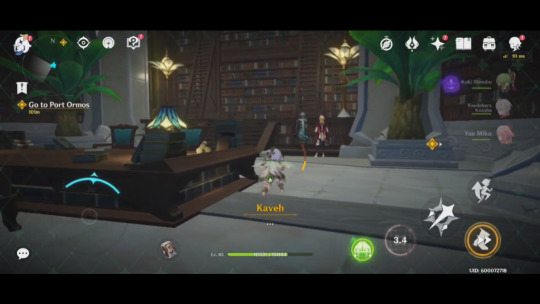
On the whole, in my opinion, Kaveh’s feelings towards Alhaitham cannot be simplified to ‘dislike’ as this is dually an inherent misunderstanding of his character, and of his and Alhaitham’s relationship, just as Alhaitham’s feelings towards Kaveh cannot be simplified to ‘dislike’ for this same reason.
In the beginning, Alhaitham and Kaveh are not supposed to be perceived as friendly, as Kaveh denies the association of ‘friends’, and Paimon describes them to the Traveller as ‘problematic’.

The reason for this is due to their character arcs being intertwined – the core issue is posed in Kaveh’s fifth character story, in that the question is raised if a compromise can be reached, if both sides of the mirror, can be balanced. At the beginning, they are entirely at odds, but even footing must be found.
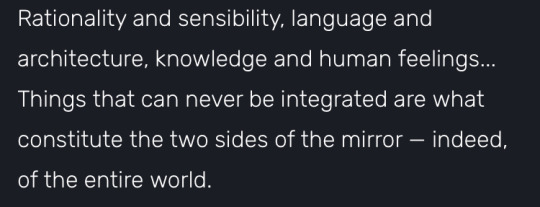
I’ve noticed a shift in online discourse after Cyno’s second story quest, as the progression in Alhaitham and Kaveh’s relationship is noticeable – deliberately, due to the flashback scene within their house (which I’ve discussed in detail here, page 122). To me, it’s more common to form the assumption that Alhaitham and Kaveh dislike each other in the Archon Quest, but with recent developments, and, hopefully, future ones, this perception is being overturned in online communities. Perhaps that’s just wishful thinking, but I’m still hopeful!
#haikaveh#kavetham#alhaitham#kaveh#genshin impact#thank you so much for your ask anon! it really ate away at my brain#haikaveh's writing is just so !?!?!? theres so many layers to peel back so a surface read of their relationship can be misconstrued as toxi#but ultimately i think these voice lines and details of their character stories are for people to question WHY they are Like That with#each other and it's one of the things i love about them that nothing is upfront or simple it really suits their themes so well#alhaitham constantly questions the world around him and flips language on its head and kaveh challenges the world with his ideals but works#with rigid principles of design and construction and he can't tell sarcasm from genuine praise which also adds to why he takes alhaitham's#words so personally... but this is improving now?? i am saying thank you cyno's second story quest <333#also the narrative that haikaveh can't stand each other seems to be more of a western thing from what i've seen online#and i think this is possibly due to the EN translation where the CN is less derisive or abrasive?#thank you to those who translate so the nuance is pointed out! <3
115 notes
·
View notes
Text
also like kudos to mr Jorge Rivera-Herrans and his team because Epic the Musical feels like the only ancient greek-inspired medium I've encountered so far that doesn't fetishise, appropriate and misrepresent ancient Greece, and as a greekTM myself I really appreciate that??? Breath of fresh air after the personal hell that's Madeline Miller's & Rick Riordan's works.
#ofc it's not like an accurate representation or anything but it doesn't TRY to be so that's okay. it's not supposed to be this like.#miracle of anc.greek retellings (cough cough miller cough). it's just a neat little musical story and that's okay!!!#epic the musical#jorge rivera herrans#epic the underworld saga#like fr im so tired of westerners usurping the narrative & my country's mythos and culture for their own gain and lofty aspirations#im so glad epic is nothing like that and i can properly enjoy it without this underlying annoyance
168 notes
·
View notes
Note
Hi Bean!
I have a question for you! I have noticed in your writings that Twilight and Yor begin a romantic relationship after their secrets are revealed. Are you opposed to any romance between them before they find out? I assume if so, it’s because it’s morally questionable, though a lot of fans find romance before compelling as it raises the stakes considerably. I’m not suggesting one is right and the other is wrong, I’m just interested in your take on this! I love your writing! Thank you! 😊
Hello you! I'm always chuffed to see your name pop up 🫶😊!
Oh boy! Thank you for this ask — it's a big question but also I do have thoughts XD Sorry it's taken me a few days to get my ducks in a row!
I want to start, though, by emphasising that my thoughts and preferences here are exclusive to Spy x Family as a canon enterprise; they don't pertain to fanworks or other fan theories, I'm not out to yuck anyone's yum ✌️ ditto for even my own writing! You're right that I don't really have an interest in exploring that dynamic but I reserve the right to change my mind ;)!
[Reference herein to manga chapters not yet animated]
Right, so. There's lots of things I love about SxF, but one of the things that interested me early and keeps me engaged is that it operates under an interesting and complex morality. Spy work and contract killing are obviously an ethical minefield, and in the real world, generally to the bad. Within the world of SxF, Endo takes pains to write Twilight and Yor both firmly on the morally right side, even if Twilight’s tactics or Yor’s actions in a vacuum are frequently questionable. With Twilight especially it seems Twilight is currently (resisting) working through the impact and ethical implication of his actions on Anya. When it comes to Yor, I expect that’s where we’ll see him wrestle with similar questions through a romance lens. I think it was quite deliberate and important that Twilight specifically articulated that he’d been wondering if Yor had previous romantic relationships, and that it was now confirmed she hadn’t. As far as I can remember, it’s the only time he’s had that sort of reflection on Yor's life before the Forgers; I mention it because it mirrors times he’s reflected explicitly on Anya’s history and trauma and her needs as a child, with implication that his actions and motivations for adopting her could/probably will hurt her. I hazard that his observation about Yor will be similarly indicative of an arc down the line.
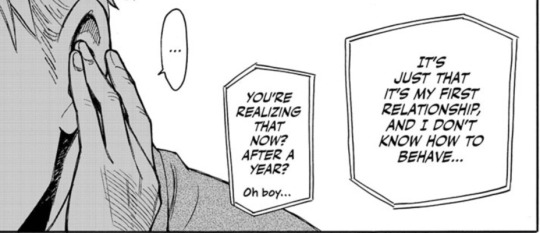

When it comes to canon, if the Yor x Twilight romance were to firm up while Yor still believes Twilight is Loid, I admit there’s a high chance I’d nope out. I want to emphasize firm up though… I tend to think Yor already has feelings for Loid (Twilight?) whether she’s fully aware of them or would necessarily articulate them as romantic (and I think this is being really interestingly conveyed and explored through her current feelings about kissing, though I may differ with some on how I think that may shake out). I also think there’s a… less high but not impossible chance that Twilight is aware he has or is developing feelings for Yor. I’ve argued before that he knows he has formed/is forming an attachment to her and that he knows he trusts her. I don’t think it’s too far from there to romantic feelings for Twilight: after all, attachment and trust (intimacy) are not things he's had in a long, long time. And given his current pseudo-short temper and general malaise comes out most with Anya, with Yor he’s been notably softer and more receptive. In my view, this is partially because so far he hasn't really done much that would really hurt Yor and nor has she done anything that would really hurt Twilight. So far, Twilight and Yor are on a fairly even footing.
This is a very long way of saying that I trend toward thinking we’ve got at least a few toes into the romance already.
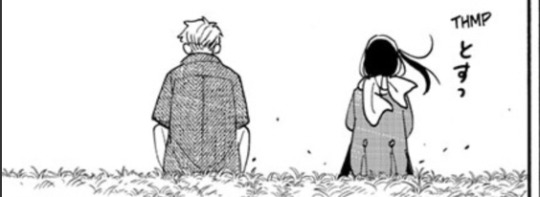
The reasons I’d be a squicked by the firming up of the romance, pre-reveal, are related to its being morally questionable as you pointed out (I'll talk a bit more about that in a moment.) But it's also because I think it would undermine character arcs and dominant themes.
Twilight’s arc involves finding and forging a new pack, a new family. Somewhere safe and loving that he’s been denied essentially for his whole life (I don’t dispute that his mother loved him deeply and did her best to protect him: living with an abuser and then with her under war was never going to actually be or feel safe). A big part of this safety and love for Twilight is about being accepted, warts and all. Twilight started lying because he wasn’t accepted by his father as he was. There’s a fair bit to work through by way of accepting Twilight’s warts already — I think Yor will be fairly understanding as things currently stand, and that’s part of why they’re a good match. Their moral compasses, their sacrifices, how they see the world and how they want to try and make it better, align and/or resonate in foundational ways. However, given their current standing, pursuing deeper intimacy of a romantic/sexual relationship with Yor before reveals, I think would take it past the line. And particularly when considering Yor’s character arc.
Yor’s arc is also around finding love and security, but centred less around acceptance (although that obviously also explicitly features!) and more around self-worth and understanding her value. If the romance were to firm up pre-reveal, the false pretences are… I mean, to me, they lob a Molotov cocktail into that theme of self-worth and being valued, as she really would just be being used: the intimacy could never be real because Twilight is not Loid Forger. To expand a bit on an earlier point, perhaps ironically, Yor’s relationship with Loid is mostly on the up-and-up: they both know any marital connection they demonstrate is fake. They may be (are) friends, and also they’re under no illusions that it’s something of a tenuous friendship (at least for now). They co-parent Anya but are clear that this co-parenting comes with clear lines around and between their relationship otherwise. I want to tread mindfully here, because I also really like and appreciate aroace interpretations of Yor and Twilight and their relationship: I think this discussion around firming up their romance actually also holds true in the case of attempting to substantially deepen their platonic bond, pre-reveal. In the same ways, Twilight needing acceptance and Yor learning self-worth would be severely undermined by a pre-reveal apparent and false deepening of their commitment to one another.
On the point of it being morally questionable generally, yeah it is. I mean, look, it's fiction and they aren't real people who can be hurt by those actions. So in principle, Endo can write what story he wants, I wouldn't think it reflected poorly on him or anything like that. I just don't really want to read a story that goes to that place; it’s a squick. I'm sure this has been discussed before in fandom, but my read on the moral dubiety centres around the idea that it isn’t possible to actively choose or meaningfully consent to emotional or physical intimacy when one person is lying about who they are (and in this case, they're both lying about who they are... Although Twilight to a greater extent). This does tie back into SxF themes as well, as choice and consent are also… maybe not big themes of SxF exactly, but active choice and informed consent are things which have come up more than once (I have my thoughts as to why: for a character whose choices drive so much of the narrative, Twilight is actually also a character who’s shown to have little actual choice or control over much of his own life. Considering his motivations for a world where children don’t cry, imo valuing active choice and meaningful consent are important factors required for that world. And I also actually suspect the theme of choice will become more important the more we learn about Donovan, and his role as foil for Twilight.)
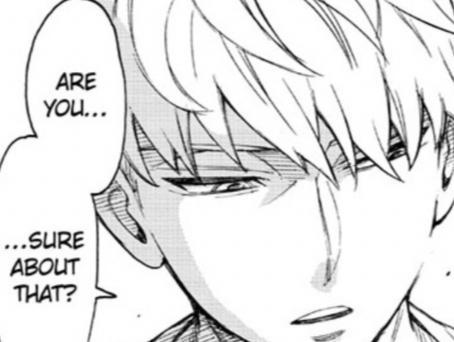
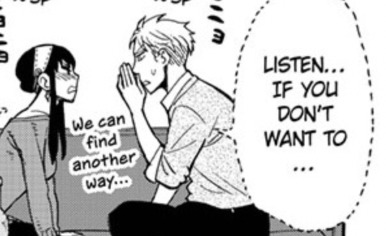

Also, honestly for me, it would be too close to a common trope in a lot of popular western fiction/media that I don’t like: a woman being taken advantage of by a man in some way, shape or form, and then through the magic of her non-specific womanness, forgiving him his gross transgressions under the thinnest of pretences. Particularly as Endo has already taken pains to sidestep that as a foundation of their arrangement. To be fair, I wouldn't be surprised that were Endo to take the pre-reveal romance path, it would be a deeper interpretation of that trope, but as with other sexist tropes utilised in pop fiction/media, I have to ask why the choice couldn’t have been for a more interesting path, rather than retreading that one. And particularly given everything he's established for Twilight and Yor: it goes against much of what Twilight stands for — and indeed goes against much of what he meaningfully brings in his current relationship with Yor, that of encouraging her, supporting her, and shoring up her thoughts, opinions and self-image, particularly when she voices upset or doubt about them. It also goes against much of what Yor stands for: while the power imbalance would lie firmly with Twilight, it remains true that Yor’s lies in an apparently deepening intimacy would also undermine the safety and security she ostensibly creates for Twilight. She also so obviously hates lying, the prospect of her keeping her secret into what she believed was a real relationship would wreck her. Doubly so, given the weight Yor puts on Loid's acknowledgement of who she is and what she believes: something she hangs her self-worth on, a recognition of her value. And I'd argue here that it would actually, conversely, be impossible for Loid Forger to acknowledge or accept Yor's truth: that's only something Twilight can do.
And so I guess there’s also just the bare fact following from the above that I think a pre-reveal firming up of their relationship is the less interesting choice for what is a major franchise that has otherwise done innovative things. Another reason I love SxF is that it subverts tropes and complicates cliches. One of which includes communication: for a pair who have crossed lines as a foundation of their relationship, Yor and Twilight actually do a lot of communicating. That’s a subversion of many heterosexual romantic tropes and norms, at least in a Western context, and, to put it sort of flippantly, it would bum me out if it failed at the final hurdle.
I just want to emphasise one more time, my opinions and preferences here are strictly related to Spy x Family in an official canon capacity, and nothing to do with fanworks or fan theories or what fans want to explore in whatever fashion. Part of my feelings here are also honestly because of the tone and pacing of SxF. I think it entirely possible to do interesting things with those tropes and actually think Endo is the type of writer I would trust to do so. But the way SxF is written by way of tone, pacing, narrative priorities and audience demand, I don't think even Endo would be able to do them within SxF in ways that wouldn't squick me out and make me lose love for Twilight, specifically, pretty entirely. I'd rather he just didn't 😂
Tl;dr: in canon exclusively I’m not into a firming up of their romantic relationship pre-reveal! Their situation is complicated enough as it is; give these goobers the love they want and can share with one another, kindly and gently, when the world has been neither kind nor gentle with them. In my view, it’s already primed in their character and thematic arcs 🫶

#thanks again for the ask! honestly i’m touched you’re curious about my thoughts on this & hopefully they don't disappoint!#and also thank you for your kind words about my writing 😳🥰!!#twiyor#spy x family#spy x family meta#sxf manga spoilers#a.m.a.#here fandom take this!#hopefully this also all makes sense...#i think this has possibly become my longest meta dsjakgljakl#it touched on a bunch of stuff i already have half-written meta about which is part of why it's so long 😅#and as always i’m struck again that i’m not familiar with japanese storytelling norms#so how much of this is novel to me a random canadian lady with primary knowledge of english-language narratives#usian dominated at that#but typical/common in japanese narratives more generally i have no idea#that endo is riffing off western media… idk how much that factors ultimately#oh i suppose i should note that i don't think 'everyone takes their secrets to the grave' is a possibility at all really
67 notes
·
View notes
Note
I want to preface this by saying that I’m not trying to be antagonistic! I don’t participate in discussions like this often but this event has sparked many discussions and a lot of intense feelings on this blog and I wanted to give a different perspective maybe?
While I fully agree that clpl took a cowardly route and didn’t have Mizuki state their secret on screen and that people have a right to feel upset by that (as I do as well; it genuinely pisses me off that they tell everyone off screen, locked behind a card story) I feel that saying that we were baited and that Mizukis story has no meaning and is pointless now is a bit much? Mizuki is still a queer character, their queerness wasn’t disproven or erased or anything like that. Yeah they didn’t have them literally say what they are, but that doesn’t diminish their story and what they mean.
Their trans identity is something that can’t and shouldn’t be disconnected from their character. It sucks that this aspect of them is hidden behind a (quite frankly) absurd amount of subtext. I will say though that the sentiment of ‘Mizuki is Mizuki’ isn’t necessarily a bad one? I can see a little how that could be seen as dismissing their identity, but they ARE mizuki. There’s far more to that character than just their Trans identity. While obviously it’s an important part of their character and part of the main conflict for this arc, I don’t believe that clpls emphasis on Mizuki being Mizuki was meant to dismiss her identity.
Mizuki has always been a kind and selfless character, Ena and the rest of niigo are very endeared to her and want them in their lives because of this! Ena states that she may not understand all of the grief that Mizuki has endured and continues to deal with because of being othered by people at school and in society, but that she is willing to learn and stay by their side. Their identity isn’t something that warrants the end of their friendship, it’s not something that Ena cares about in the sense that it doesn’t change who Mizuki is as a person.
I’m not sure how the Japanese fanbase is reacting to this but I feel that the Western fanbases focus on having them literally say what they are seems in line with how queerness is expressed in Western countries like the US. (I myself am an American, and a queer person.) I can only go off of what I’ve seen in Japanese media, but they seem to be a bit more reserved when talking about being queer. It’s usually alluded to, and not explicitly stated all of the time. There’s clearly a cultural aspect as to why this story was told the way that it was. (There was also most likely corporate meddling as well though, lmao)
I do believe that clpl had good intentions with this particular story. It is very unfortunate that some things happened the way that they did, but I think that it’s important to look at what we were given and try to see what was trying to be conveyed. Perhaps that is a bit naive, and I’m not saying that everyone needs to accept the story that we were given and not look at it critically. Leaps and bounds still need to be made in terms of how stories like these are told. I’m saying that we should be a bit more open minded to the various aspects that gave us the story that we got.
I hope that that was coherent, this is something that I’m a bit passionate about as well! Thank you for taking the time to read my thoughts, I hope that you have a lovely day/night!
.
#i will just add in the tags that while i don't think clpl entirely meant anything harmful with the mizuki is mizuki comment#it doesn't change that the meaning that statement has taken on in the fandom western or eastern is a generally negative one#that's usually used to justify a stance against Mizuki's trans narrative#so even if it was not 100% intentional it feeds into playing both sides and appealing to the opposition#asks
43 notes
·
View notes
Text




red, i love you and the world
#i couldn’t pick the palette i liked the most#trigun 98#trigun#trigun stampede#nicholas d. wolfwood#nicholas d wolfwood#trigun wolfwood#anyways don’t ask me about what the imagery in this is all supposed to mean. like if u get it u get it if u don’t u don’t#also you should listen to the song linked it fits wolfwood’s character well i think#and yes it is originally from red dead it’s a good soundtrack#honestly a lot of the rdr2 songs fit into trigun..westerns and doomed narratives and all that
379 notes
·
View notes
Note
In a recent post, you talk about how certain media will have QPOC characters that "feel white." Are you willing to explain more on how that happens? I'm a QPOC person that writes a decent amount of QPOC characters, and it's always interesting seeing other people's takes on how to handle that in stories.
Sure! Most of the time when I say a QPOC character "feels white" is that it lacks intersectionality. Intersectionality is about acknowledging how different marginalized identities manifest in a person, creating a unique experience. Most writers assume QPOC are just "white queer person with a palette change" instead of "we go through similar things but in an entirely different way".
A good example is Heartstopper (A show I like btw!! I can only speak for the tv show and season 1!). It's often incorrectly dismissed as fluff/escapism when it's actually a show that talks directly about marginalization (transphobia, homophobia, etc.) specific to Britain, and some really dark topics come up sometimes. But I was surprised at how little (if not at all?) racism was brought up as something QPOC struggle with. The plot with Tara (a Black girl) and Darcy (a white girl) coming out as a lesbian couple but Tara ended up struggling with the backlash was the perfect opportunity to talk about how she deals with compounded racism, sexism, and homophobia (perhaps even from her own community). But it wasn't brought up at all in that season. I'm sure this gets expanded on in future seasons but it did feel like a huge missed opportunity to me, especially since the show was so open to directly talking about queerphobia. It ends up looking selective about what issues the writer is comfortable talking about.
Intersectionality connects with everything, including joyful stories. A queer paradise to me is a world where we reclaim indigenous queer culture that was suppressed by colonialism, a place where we don't have to cut our cultural ties and end up embracing a westernized version of queer identity, where our language expands to include queer people, where we acknowledge that things like "body positivity" and disability acceptance are inherently linked with racial justice, where we can be whole. In these narratives with QPOC that "feel white", something is always lost. Whether that be culture, language, religion, anything. In She-Ra, the QPOC are just that. We get a dumpling once and a while as "representation" but that's it.
#askjesncin#media criticism#if u asked me if I like She-Ra btw I would say yes! I enjoy that show. It's fun. But I can also critique it#there was a point where I got honestly fed up reading western “diverse queer books” bcuz I couldn't connect to the QPOC characters#I read queer stories from local authors and it was a world of difference. yea the stories hurt but they were willing to acknowledge-#-lived realities and hardship. instead of erasing it to create a convenient narrative for white ppl
50 notes
·
View notes
Text
The other day I saw someone say that Jet would beat Zuko’s ass effortlessly in a sword fight, to which I say - does the epic fight in the tea shop mean nothing to you? They literally could not be more evenly matched 😭😭
#GIRL the fanon brain rot is so real#it’s the same thing with the bizarrely persistent narrative in fandom that zuko is a bad bender#like. he’s not a bad bender he’s just not as good as *checks notes* ozai azula and iroh- some of the best fire benders in the world#and that is irrelevant by the end of book 3 when zuko is now able to match azula (as we see when she attacks the western air temple the#fight on the gondola in the boiling rock and then the final fight. and no azula would not have won that fight even she hadn’t cheated btw)#it’s also the same with fics insisting that zuko is just a uwu stupid little baby boy and removing all sense of personality from him in#favour to make him an ‘awkward turtle duck’#like he IS that but that’s not ALL he is good lord#anyway. I’m annoyed.#jet and zuko fight my beloved.#ch: zuko#ch: jet#hattie talks#dyn: zuko & jet#form: txt#misc: fandom
25 notes
·
View notes
Text
Thinking about why “redemption” plots for JGY don’t work for me, I feel like it boils down to this: redemption implies that one needs to 1) understand what they did wrong 2) atone for it through suffering and/or selfless actions
But JGY has already done both of those things in canon. He both understands very well and dislikes most of the things he had to do, and as soon as he gained a measure of power he used it pointedly to help others (actually, even before he had power he was saving sect leaders and winning wars)!
You want him to redeem himself through suffering? He’s already suffered more than just about anyone else in the book! You want him to redeem himself through public service? He’s been doing that for well over a decade!
In short, redemption arcs don’t work for me because I read JGY as someone who, as long as his life is not threatened (and sometimes even then) already chooses to do good. So I don’t think he needs to learn or discover in himself the will to do good (through a redemption arc) - he only needs the chance and relative safety that allows him to act on it.
#Jgy tag#shhh shiome#Jin Guangyao#Jgy wants to 1) survive 2) do good 3) have quality time with lxc but that is unrelated to the content of this post#Like if you really must use a western redemption narrative at least recognize that he is already going through the required steps as is!#Also I get that many writers just use the redeemed tag to mean there is no jgy hate in the fic and I appreciate that but still#mdzs meta
366 notes
·
View notes
Note
hello! I always like reading your thoughts on various media set in Ancient Rome and I was wondering if you had any thoughts on i claudius?
(I don’t know if you’ve talked abt the show but tumblr search is being awful rn)
thank you for reading and i hope you have a good rest of your day!
oooh I don't think I've really talked about I Claudius here
I enjoy it a lot! its pretty stripped down compared to the big epic productions set in Rome, and it's 1000% to it's favor. kind of like how artists will do limited palettes to push their boundaries, or stage productions allow you to escalate the character in ways you don't get to experience in other mediums. all of that pushes the show into a space where the spectacle of interpersonal drama really thrives and shines
also I like the aspect ratio it was filmed in! I think it adds a visual tightness that exemplifies how the character narratives interlock with each other, especially since the whole thing is like watching a cascading crash of dynastic dominoes.
#ngl all the thoughts i have about I Claudius have been said by other people in a much better way than I could#esp wrt to its impact on the real heavy hitters of western prestige television and dramatic#television narrative as a whole! also the caligula stuff is fun#it's honestly pretty high up there for me wrt to rome related media#if i had to pick between hbo rome and i claudius on which handles visual and narrative claustrophobia better. i'd have to spend a#solid five minutes thinking about it#ask tag
23 notes
·
View notes
Text
Uncompiled
Note: These are short stories that have been published in magazines/as individual ebooks but haven't yet become part of a The Ravens' Hundred Flowers compilation book.
①さわべりのきじん ー The Eccentric at Marsh's Edge
Timeline: Years before The Raven Doesn't Choose its Master
Characters (in order of relevance): Sumio, Nazukihiko
Synopsis: 13 years old Sumio is at an age where he needs to consider what to do about his future, yet finds himself struggling to make a choice. But then, a chance meeting may change everything for him.
②きらをきそう ー A Competition for Beauty
Timeline: During the Second Arc
Characters (in order of relevance): Spoilers
Synopsis: Spoilers
③かりんみず ー Quince Water
Timeline: After A Raven to Remember
Characters (in order of relevance): Spoilers
Synopsis: Spoilers
#I may tackle the Sumio one late into Ravens of Prosperity which is why this is here#The other two are very strictly and clearly part of the Second Arc narrative and hence a spoilerfest for the western fandom#Adding details on them is too risky so they shall remain like this for now#not a translation
14 notes
·
View notes
Text
I think one of the weirdest thing to me about Helluva Boss is how they keep proving that Striker is right but at the same time they refuse to let Striker himself be right.
Someone on twitter pointed out that in Oops Striker talks about it being an embarrassment to imp kind that Fizz is a purse-dog to his over-bloated master, and then, while Striker might’ve been referring to Ozzie (although the use of over-bloated makes me wonder if he truly meant Mammon), the entirety of the next episode is all about Fizz saying fuck you to Mammon (his master) and quitting his job because he doesn’t wanna be exploited or abused anymore.
And this just reminded me how in the first season they had Striker say to Blitz “Starting with the one that treats you like a plaything.” about Stolas’ treatment towards him in Harvest Moon and then in Truth Seekers (the next episode) they literally had Stolas say “Who dare threaten my impish little plaything.”
I don’t know if this parallel is on purpose but that’s twice now where in back to back episodes in each season Striker has a made a point about the hierarchy in his episode and then the following episode goes out of its way to prove his point.
I just think it’s odd how they prove that he is right in other character’s storylines but in Striker’s own storyline he’s like not allowed to have a win despite everything around him saying he should.
#idk i just have a lot of thoughts about the way striker’s story is handled#ik it probably doesn’t matter bc he’s a villain in the narrative#but I think he’s so interesting okay😭#i just feel like striker being a villain shouldn’t negate that he IS right#but also bc he is a villain people don’t pay attention to his dialogue and won’t notice these things#like I swear no one listened to anything he said in western energy despite him saying sm about his struggles#drives me up the walllllll#why couldn’t i be obsessed with a main character#noo the cowboy had to catch my attention#we strugging out here striker nation LMAO#helluva boss#helluva boss striker#striker helluva boss#helluva boss fizzarolli#helluva boss blitz#helluva boss blitzo#helluva boss stolas
60 notes
·
View notes
Text

Dang Howdy! C1P33!
Blue Shadows on the Trail~
#Art#Comic#Dang Howdy!#Kobold#Esmeralda Diamondscale#Marbles Diamondscale#Sparky Diamondscale#Anthro#Scalie#Furry#Western#Colors#Backgrounds#Singing#Song#Narrative
22 notes
·
View notes